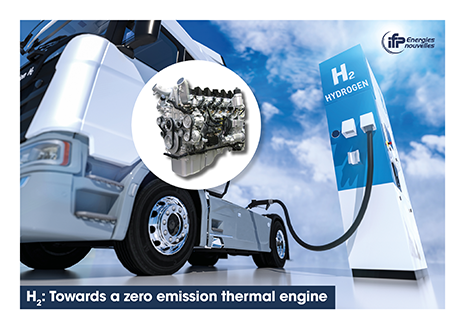10.02.2021
2 minutes of reading

IFP Energies nouvelles (IFPEN) steps up its research workon the hydrogen combustion engine
Decarbonized mobility will rely on both electric vehicles and hydrogen solutions featuring a fuel cell to provide electricity or a combustion engine to provide direct power. Hydrogen offers an interesting alternative when a long range and/or a short recharging time is required, particularly for Heavy Duty Vehicles.
IFPEN, through its Transports Energie Carnot Institute, is committed to conducting research in these different areas and is stepping up its R&I activities around the hydrogen internal combustion engine. By relying on existing industrial tools, this technology provides a mobility solution without CO2 emissions that can be implemented in the short/medium term and at lower cost.
IFPEN's expertise for hydrogen mobility
Since 2019, IFPEN has been working in synergy with an ecosystem of industry players on two hydrogen mobility solutions: use in a fuel cell and direct injection in an internal combustion engine. To achieve this, IFPEN is drawing on its recognized expertise in the energy optimization of systems, in particular with the Simcenter Amesim simulation tool from Siemens. IFPEN is also harnessing its expertise in improving the efficiency of gasoline and gas engines, as well as on its combustion modeling tools, developed with CSI, publisher of the Converge software, and its experimental resources.
With a view to stepping up its work on the hydrogen combustion engine, which requires specific developments, IFPEN has recently acquired a dedicated test bench. For the powertrain, the choice has been made for technological solutions that provide both very high efficiency and very low nitrogen oxide (NOx) emissions: lean-burn combustion system derived from gasoline technologies, direct injection, turbocharging.
"Our goal is to move closer to 50% efficiency and to become a benchmark player in the field of hydrogen combustion, in particular by relying on new test facilities," says Florence Duffour, Hydrogen Engines Project Manager at IFPEN.
A solution for carbon-free road transport
Both hydrogen mobility avenues are part of the ecological transition and are currently being researched at IFPEN, particularly in certain market segments such as utility vehicles, long-distance trucks, off-road vehicles (agricultural machinery, construction equipment, etc.) as well as rail, river and sea transport
With a lifespan identical to that of existing internal combustion engines, hydrogen engines can also be very competitively priced because the technology is mature and production investments are limited. In addition, it does not require the use of high-purity hydrogen, making fuel distribution easier.
"The rollout of the hydrogen internal combustion engine will help accelerate the energy transition in transportation for certain types of use, in particular for long-haul trucks. We estimate that prototype trucks incorporating a hydrogen combustion engine should be available by 2022-2023," commented Bertrand Gatellier, Powertrains and Systems Program Manager at IFPEN.
Press Contact
Anne-Laure de Marignan, IFPEN – presse@ifpen.fr






